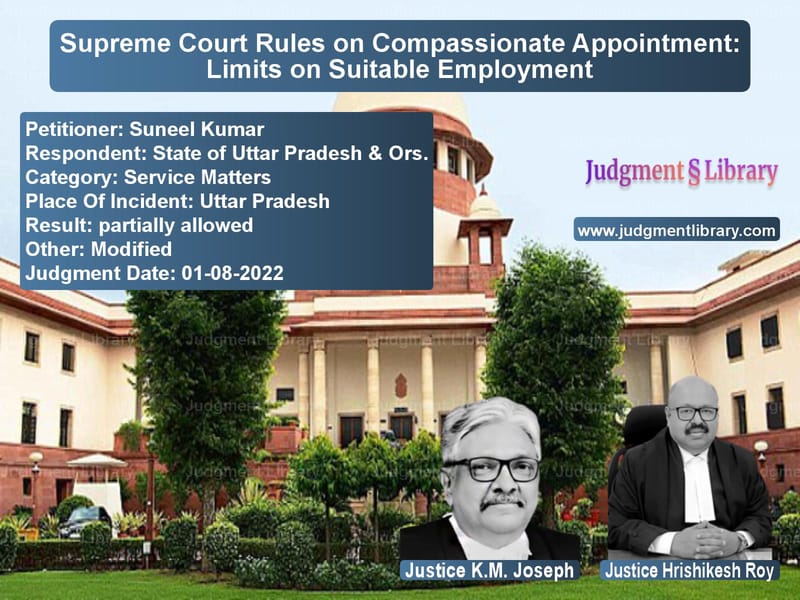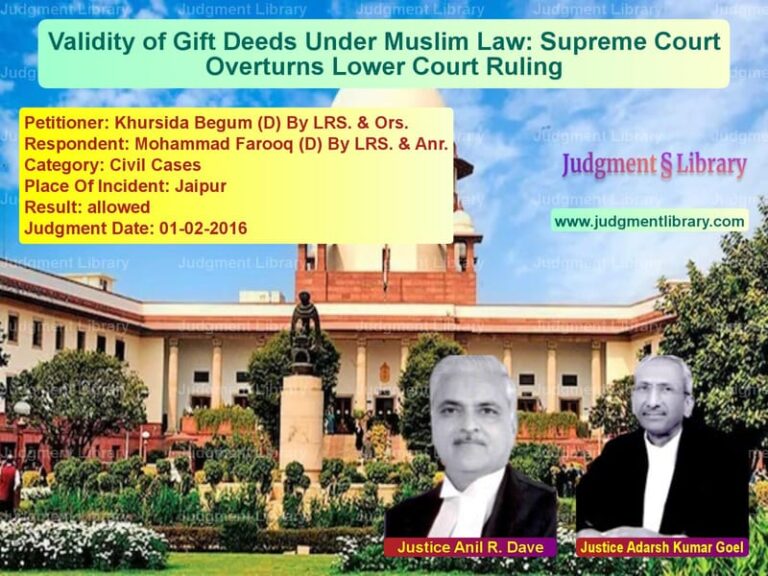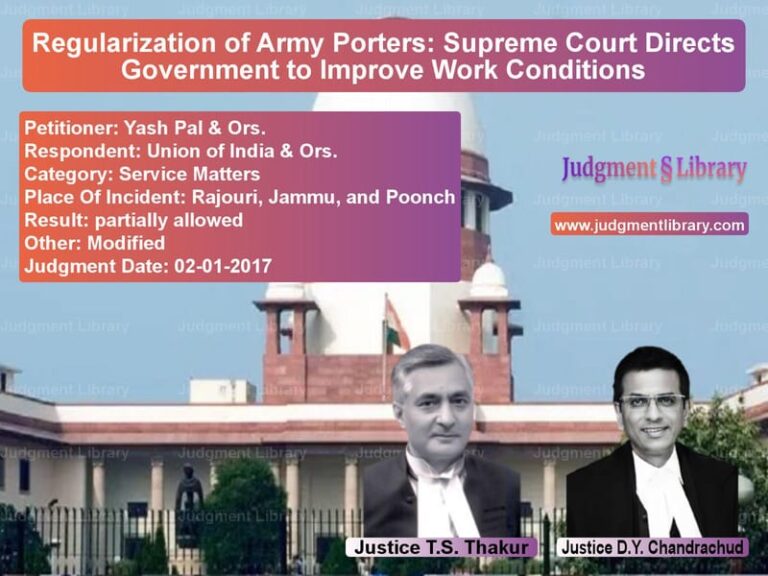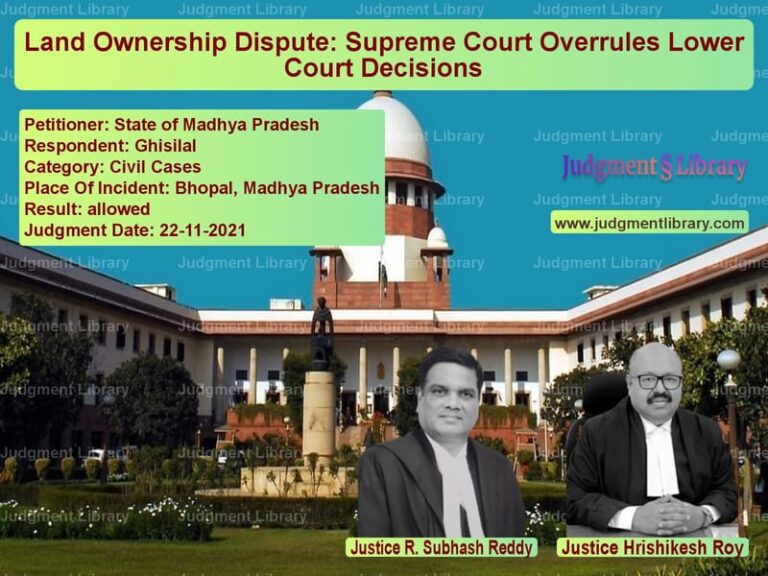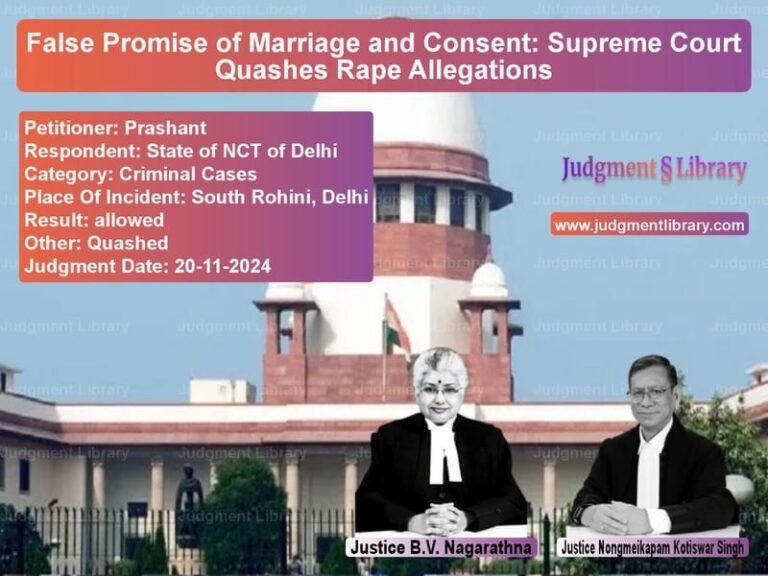Supreme Court Rules on Compassionate Appointment: Limits on Suitable Employment
The case of Suneel Kumar vs. State of Uttar Pradesh & Ors. examines the legal interpretation of ‘suitable employment’ under Rule 5 of The Uttar Pradesh Recruitment of Dependents of Government Servants Dying in Harness Rules, 1974. The Supreme Court ruled that compassionate appointments must align with the position held by the deceased employee and cannot be upgraded based on the dependent’s qualifications.
Background of the Case
The appellant, Suneel Kumar, applied for a compassionate appointment after the death of his father, a Class-IV employee (Sweeper) in the Uttar Pradesh government. He requested appointment as a Gram Panchayat Officer, a Class-III post, arguing that he held higher educational qualifications and was eligible for the post.
The government, however, offered him a Class-IV post of Sweeper, which he declined. After multiple representations and legal proceedings, the High Court upheld the government’s decision, stating that the compassionate appointment was meant for immediate financial relief rather than career advancement.
Legal Issues Before the Court
- Whether the appellant was entitled to appointment in a Class-III post instead of a Class-IV post under the Dying-in-Harness Rules.
- Whether a dependent’s higher educational qualifications could determine the nature of employment offered.
- Whether the interpretation of ‘suitable employment’ should be based on the qualifications of the dependent or the designation of the deceased.
Arguments Presented
Petitioner’s (Appellant’s) Arguments
- The appellant argued that the government had previously allowed dependents to be appointed to Class-III posts even if the deceased held a Class-IV post.
- He cited government notifications and High Court rulings that recommended offering employment based on the qualifications and suitability of the applicant.
- He contended that refusing a Class-III post solely based on his father’s designation was unfair and arbitrary.
Respondents’ (State of Uttar Pradesh’s) Arguments
- The state government argued that compassionate appointment is not a right but a concession to support the bereaved family.
- It maintained that the purpose of the scheme was to provide financial relief and not employment based on career progression.
- They cited previous Supreme Court rulings that restricted dependents from claiming higher posts than what the deceased held.
Supreme Court’s Observations
On the Objective of Compassionate Appointments
The Supreme Court, comprising Justice K.M. Joseph and Justice Hrishikesh Roy, reaffirmed that the primary objective of compassionate appointments is financial relief, not career enhancement.
“Compassionate appointment is not a vested right and must align with the post held by the deceased employee.”
On the Meaning of ‘Suitable Employment’
The Court interpreted ‘suitable employment’ under Rule 5 in light of the deceased’s position rather than the dependent’s qualifications.
“The superior qualification of the dependent cannot determine the scope of the words ‘suitable employment’. The employment should be in line with the post held by the deceased.”
On the Appellant’s Request for a Class-III Post
The Court ruled that the appellant’s request for a higher post was not justified, stating:
“If the deceased held a Class-IV post, the dependent cannot demand a Class-III post solely based on superior qualifications.”
Judgment and Its Implications
The Supreme Court ruled against the appellant’s claim for a Class-III post but directed the government to reinstate his appointment as a Sweeper, as originally offered.
- The appellant’s request for a Class-III post was rejected.
- The government was directed to reinstate the offer for a Sweeper’s post.
- The judgment reinforced the principle that compassionate appointments cannot be treated as an avenue for higher employment.
Significance of the Judgment
- Clarifies Employment Rights: The ruling ensures that ‘suitable employment’ under compassionate appointment is tied to the deceased’s post.
- Limits Claims for Higher Posts: The decision prevents misuse of compassionate appointments for career advancements.
- Protects Policy Intent: The judgment upholds the objective of financial relief rather than employment preference.
Conclusion
The Supreme Court’s ruling in Suneel Kumar vs. State of Uttar Pradesh sets a precedent in limiting claims for higher posts under compassionate appointments. By directing the appellant to accept the Sweeper’s post, the Court reaffirmed that such appointments serve as social security rather than career progression opportunities.
Petitioner Name: Suneel Kumar.Respondent Name: State of Uttar Pradesh & Ors..Judgment By: Justice K.M. Joseph, Justice Hrishikesh Roy.Place Of Incident: Uttar Pradesh.Judgment Date: 01-08-2022.
Don’t miss out on the full details! Download the complete judgment in PDF format below and gain valuable insights instantly!
Download Judgment: suneel-kumar-vs-state-of-uttar-prade-supreme-court-of-india-judgment-dated-01-08-2022.pdf
Directly Download Judgment: Directly download this Judgment
See all petitions in Employment Disputes
See all petitions in Public Sector Employees
See all petitions in Recruitment Policies
See all petitions in Judgment by K.M. Joseph
See all petitions in Judgment by Hrishikesh Roy
See all petitions in partially allowed
See all petitions in Modified
See all petitions in supreme court of India judgments August 2022
See all petitions in 2022 judgments
See all posts in Service Matters Category
See all allowed petitions in Service Matters Category
See all Dismissed petitions in Service Matters Category
See all partially allowed petitions in Service Matters Category

